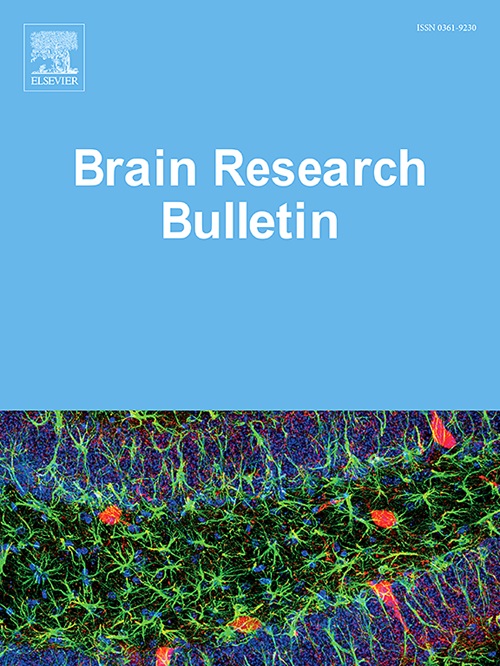Gut microbiota dysbiosis and disturbed tryptophan metabolism mediate cognitive impairment in mice with circadian rhythm disruption
IF 3.7
3区 医学
Q2 NEUROSCIENCES
引用次数: 0
Abstract
Circadian rhythm disorder (CRD) is a risk factor for cognitive deficits, yet its mechanisms remain unclear. We previously found CRD model mice developed cognitive impairment mediated through gut microbiota disturbance, intestinal barrier damage, and microglia activation, but the signaling pathway was undefined. Here, we show CRD induces cognitive deficits and gut microbiota disturbance in mice. Fecal microbiota transplantation (FMT) from CRD mice to normal mice reproduced intestinal barrier damage, microglia activation, neuronal damage, and cognitive deficits. Notably, gut metabolite analysis revealed significant alterations, with tryptophan metabolism being particularly affected: tryptophan decreased by 26.9 % and 5-hydroxytryptophan (5-HTP) by 30.7 % (both P < 0.05). Dietary tryptophan supplementation restored serum tryptophan and 5-HTP levels, ameliorating the neuronal damage and cognitive deficits caused by CRD gut microbiota. Collectively, these findings indicate that disturbances in gut microbiota and metabolites play a key role in CRD-induced neurological damage in mice, suggesting targeting the gut microbiota or tryptophan metabolism may prevent CRD-induced cognitive dysfunction.

肠道菌群失调和色氨酸代谢紊乱介导了昼夜节律紊乱小鼠的认知障碍
昼夜节律障碍(CRD)是认知缺陷的危险因素,但其机制尚不清楚。我们之前发现CRD模型小鼠通过肠道微生物群紊乱、肠道屏障损伤和小胶质细胞激活介导认知障碍,但信号通路尚不明确。在这里,我们发现CRD诱导小鼠认知缺陷和肠道微生物群紊乱。粪便微生物群移植(FMT)从CRD小鼠到正常小鼠再现肠屏障损伤,小胶质细胞激活,神经元损伤和认知缺陷。值得注意的是,肠道代谢物分析显示了显著的变化,色氨酸代谢受到特别影响:色氨酸下降26.9 %,5-羟色氨酸(5-HTP)下降30.7 % (P均为 <; 0.05)。膳食中添加色氨酸可恢复血清色氨酸和5-羟色胺水平,改善CRD肠道菌群引起的神经元损伤和认知缺陷。总之,这些发现表明肠道微生物群和代谢物的紊乱在小鼠crd诱导的神经损伤中起着关键作用,表明靶向肠道微生物群或色氨酸代谢可能预防crd诱导的认知功能障碍。
本文章由计算机程序翻译,如有差异,请以英文原文为准。
求助全文
约1分钟内获得全文
求助全文
来源期刊

Brain Research Bulletin
医学-神经科学
CiteScore
6.90
自引率
2.60%
发文量
253
审稿时长
67 days
期刊介绍:
The Brain Research Bulletin (BRB) aims to publish novel work that advances our knowledge of molecular and cellular mechanisms that underlie neural network properties associated with behavior, cognition and other brain functions during neurodevelopment and in the adult. Although clinical research is out of the Journal''s scope, the BRB also aims to publish translation research that provides insight into biological mechanisms and processes associated with neurodegeneration mechanisms, neurological diseases and neuropsychiatric disorders. The Journal is especially interested in research using novel methodologies, such as optogenetics, multielectrode array recordings and life imaging in wild-type and genetically-modified animal models, with the goal to advance our understanding of how neurons, glia and networks function in vivo.
 求助内容:
求助内容: 应助结果提醒方式:
应助结果提醒方式:


